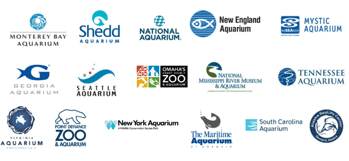The Aquarium will be closed to the public on Wednesday, April 2, for an internal staff event. Regular operating hours will resume on April 3.
Break Free From Plastic Pollution Act would require packaging producers to address, finance recycling and waste
BOSTON, MASS. (February 11, 2020) – The New England Aquarium is teaming up with 15 other aquariums across the country in support of new federal legislation that would tackle plastic pollution, an increasing hazard to the health and well-being of sea turtles, dolphins, whales, fish, and other marine animals in oceans all over the world.
U.S. Senator Tom Udall (D-New Mexico) and U.S. Representative Alan Lowenthal (D-California) announced Tuesday the Break Free From Plastic Pollution Act. The legislation aims to shift the burden of managing product packaging waste from local and municipal governments to the producers of single-use products and packaging. The bill would require producers of packaging, containers, and food-service products to design, manage, and finance waste and recycling programs; ban certain single-use plastic products that are not recyclable; and protect state and local governments that enact more stringent standards.
“It’s exciting that the conversation about plastics is moving beyond what consumers can do and is starting to address the problem at its source, which means including plastic producers as part of the solution,” said Vikki Spruill, President and CEO of the New England Aquarium.
The New England Aquarium is part of a coalition of 16 leading aquariums supporting the Break Free From Plastic Pollution Act. While many communities in Massachusetts have taken action to reduce plastic use with bag bans and other ordinances, there is significant work to be done on the state and federal levels. Developing innovative solutions will take collaboration among consumers, industry, and government if we are to protect aquatic ecosystems. Global plastic production accounts for 20 percent of all global oil consumption and is projected to double by 2025 if nothing is done. For marine animals, plastic poses significant health risks and hazards. It is widely estimated that 90 percent of sea birds and thousands of sea turtles, fish, and other marine animals have ingested plastic, which can eventually kill them.
Please find below the official joint statement from members of the Aquarium Conservation Partnership.

Statement of U.S. Aquariums’ Support for the Break Free From Plastic Pollution Act
On behalf of the nation’s leading aquariums, we applaud Senator Udall and Congressman Lowenthal for their leadership on reducing the sources of ocean plastic pollution, a global crisis in urgent need of coordinated action at the national level. We support the comprehensive approach included in the Break Free From Plastic Pollution Act that can help stem the tide of pollution that is impacting our waterbodies and wildlife across the country and around the world—from mountain streams, to the Great Lakes, to rivers running to the sea, and throughout major ocean basins.
Tackling plastic pollution in a meaningful way takes the best science as well as concerted action by industry, consumers, and government. Our position on this issue is grounded in recent research that shows how plastic has become ubiquitous throughout our ocean and waterways—and how this plastic is impacting aquatic wildlife and ecosystems. Even more alarming is how the pace of plastic use and production is vastly outpacing our ability to effectively manage plastic waste. Nearly 9 million tons of plastic enters the ocean each year, and this amount is expected to double by 2025 if nothing is done. We need to act now to reverse this trend.
As members of the Aquarium Conservation Partnership (ACP), we have eliminated single-use plastic straws and shopping bags from our institutions. Our 22 ACP aquariums in 17 U.S. states—from the coasts to the heartland– are also working to eliminate nearly one million plastic beverage bottles a year, and transition away from all single-use plastic food service ware in our cafes. We also message to over 25 million visitors a year on the problem of plastic pollution, and how consumers can change their practices to improve the health of our ocean, lakes, and rivers.
We are working with our business partners to accelerate a shift away from single-use plastic in the broader marketplace. Over 600 businesses—including United Airlines, the Chicago White Sox, Dignity Health hospitals and Farmer Brothers Coffee— have made plastic-reduction commitments in collaboration with our aquariums. We have also joined our communities in advocating for single-use plastic reduction actions by governments in cities and states across the nation, including Seattle, Chicago, Baltimore, Boston, Charleston, Tampa, New York, Washington, Virginia and California.
We support the vision set forth in the Break Free from Plastic Pollution Act to facilitate coordinated action by U.S. industry, consumers, and government to develop innovative solutions to reduce single-use plastic, increase recycling and composting, and harness the best practices and policies from leading U.S. states and cities. We look forward to working with our congressional representatives to drive action on this urgent threat to our aquatic wildlife and ecosystems, and create a healthier future for communities across the nation.
ABOUT THE NEW ENGLAND AQUARIUM: Since 1969, the New England Aquarium has been a catalyst for global change for our ocean. Through public engagement, commitment to marine animal conservation, leadership in education, innovative scientific research, and effective advocacy and partnerships, the Aquarium is dedicated to building a vital and vibrant ocean on this blue planet. Learn more: neaq.org.
MEDIA CONTACTS:
Pamela Bechtold Snyder, 617-973-5213; psnyder@neaq.org
Diana Brown McCloy, 978-697-9414; Diana@teakmedia.com
